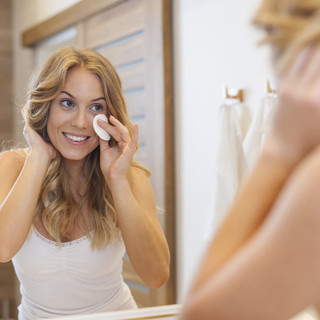Skincare Myths We Need to Stop Believing
Posted by Ellie Swain on Oct 30th 2020
As consumers, we’re flooded with skincare advice everywhere, from the pages of our favorite fashion magazines to online beauty blogs. Unfortunately, a lot of it inaccurate and many of it doesn’t help us on our ongoing quest to perfect skin.
Ever heard that makeup causes acne? Or that warm water helps open our pores? These are some of the skincare myths that many of us are led to believe.
Ready to learn the truth behind these and more beauty myths? We’re here to spill all. It’s time to get schooled!
Myth 1: You’ll Eventually Outgrow Acne
Ah, if only if this one was true. The sad reality is that acne is a common skincare problem among grown women in their 20s, 30s, 40s, and even 50s. These acne issues occur as they would in teenagers, and the same treatment principles remain the same, despite age.
Not everyone who suffered from acne as a teenager will grow out of it, and many women who were lucky enough to have clear skin when they were younger go on to develop acne later in life.
Women’s hormones fluctuate throughout their lives, which is why so many experience pesky breakouts, especially around their menstrual cycle.
For many women, finding the right products to help deal with breakouts is the easiest solution. If you suffer from acne, PCA Skin’s Acne Salicylic Acid Gel treatment works to banish existing blemishes and helps prevent future breakouts.
Myth 2: Wearing Makeup Causes Acne
On the subject of acne, another common myth is that wearing makeup is a direct cause of acne.
While it’s easy to blame breakouts on makeup, there’s no research available to suggest that makeup or skin-care products directly cause acne, and there’s no consensus on which ingredients would contribute to acne.
However, you do need to apply and correctly remove makeup to avoid acne breakouts. Use regularly cleaned brushes (yes, washed weekly!) to apply your products and always remove makeup at the end of the day. That means no rolling into bed after a few drinks with a full face of makeup on!
For a thorough wash before bed, Dermaceutic Oxybiome Cleansing Micellar Water dissolves makeup and cleanses and refreshes skin leaving it perfectly clean.
If you practice wearing makeup properly, there’s no reason why it should contribute to acne breakouts.
Myth 3: Pores Open and Close Based on Water Temperature
The idea that facial pores open and close depending on water temperature is a myth that most of us believe.
While pores may appear more visible if you use hot water to cleanse your face, that’s because your skin bloats with the use of warmer water – not because your pores have opened.
The truth is, pores don't open or close due to temperature. However, for the best results when cleansing before bed, use lukewarm water to wash your face in the morning and evening.
Myth 4: You Don’t Need Sunscreen If You’re Wearing Makeup That Has SPF
Sure, wearing makeup with SPF in the formula is helpful for your skin. But you shouldn’t rely on it as your face’s only line of defense against the harsh beating rays of the sun.
Even if you’re wearing a full face of foundation featuring SPF, you still need to have a layer of sunscreen underneath your warpaint to gain maximum protection from the sun. After all, you don’t want to age prematurely because of a myth you’ve always believed!
Another mistake many make is skipping the sunscreen on cloudy days. Even if the sky is thick with looming clouds, you still need to wear sunscreen. This goes for every day!
You can spot the harmful UVA or UVB rays as they’re not in the visible light spectrum. But that doesn’t mean they aren’t there, ready to penetrate unprotected skin.
Use a high SPF sun protection cream daily such as Glymed Plus Moisturizing Protection Cream with SPF 30. Not only does the formula protect skin from the sun, but the anti-aging cream helps nourish and revitalize skin.
Myth 5: Natural Ingredients Are Better for Skin Than Synthetic
Yes, many natural ingredients indeed work wonders for the skin. But there’s no factual evidence to suggest that natural ingredients are better for the skin than synthetic ingredients.
Plus, not only is the definition of natural blurred within the world of skincare, but it’s also loosely regulated. That means many cosmetics companies can use the phrase to mean whatever they like it to mean in their marketing strategies.
Just because a skincare ingredient is found in nature, it doesn’t make it a superfood for the skin. The same goes for synthetic skincare ingredients too. Just because a product is designed with synthetic ingredients, it doesn’t mean its not a quality choice.
If you’re unsure about either a natural or synthetic ingredient in a product, your best bet is to undertake some online research to learn more about it.
Fancy more skincare advice? There may be other mistakes you’re making daily. If you’re constantly fighting your skin, here are the skincare crimes you may be committing.

